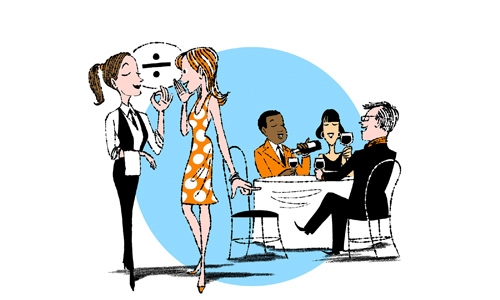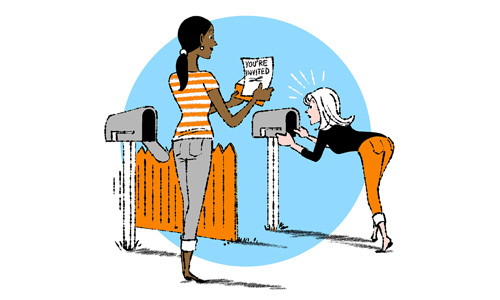Here’s the Most Polite Way to Split a Bill
When was the last time you sent a thank-you note to a friend after being invited over for dinner? Forget? You know why? Because you probably never did. No one does that anymore. Somewhere between unfriending and Instagramming every aspect of our lives, the rules of decorum that we’d all lived by changed. Well, we’re going to correct that. We polled our friends for the etiquette conundrums that vex them most. Then we asked experts to assess the correct way to proceed. Oh, and if you like what you read, feel free to send a thank-you note. That would be nice.
For Whom the Bill Tolls
You’re out to dinner with friends and order a measly hot dog—“hold the bun.” Everyone else orders foie gras, lobsters, and Ketel One martinis. The check arrives. Now what?
Oh, to live in Germany, at least when it’s time to pay the tab. There, says Siobhan Callahan, an American who teaches English in the town of Bremen, “the assumption is that everyone will pay separately.” In fact, Callahan says, generally the waitress comes to the table at the end of the meal and announces to each person, “‘Let’s see; a coffee is 1.50, and a burger is 15—you owe me 16.50.’ She does it all in her head.”
This would relieve a party platter of anxiety on the part of people like …me. Those of us who have to steel ourselves before going out to dinner, knowing that the check will probably be split equally, even though we will have eaten waaaaaay less expensively (for all sorts of psycho/social/cheapo reasons) than everyone else. I try to think of it as an entertainment tax, the price paid for socializing. I try and try and try.
Minneapolis doctor and businesswoman Archelle Georgiou has come up with the classiest way to avoid this turmoil, short of ordering three lobsters for yourself. If her friends are boozers, she says, “I’ll tell the waitress at the beginning, ‘We’ll have separate checks for this bill.’ It’s between me and the waitress, but they all hear it, and that’s worked out quite well.” Until America goes German, this could be your best bet. Especially for those of us who order just the soup and fill up on the crackers.
Sending Condolences
Your friend’s husband dies. You didn’t know him that well. But still.
The thing is, we all know the right thing to do when we hear of a friend’s or relative’s loss: Write that sympathy card and mail it already! But what if you don’t have a sympathy card around? Or you do, but the corner’s kind of bent? Or what if you don’t know your friend’s snail mail address offhand and keep forgetting to look it up until it’s 11:30 at night and you’re drifting gently off to sleep when suddenly you remember, I STILL HAVEN’T MAILED THAT CARD!!!? And now your heart is pounding, and you are electrified with self-loathing … but still too toasty under the covers to actually get out of bed and do anything? If you’re tempted to text a sad-faced emoji just to get something out, don’t. That’s right up there with “liking” the news on Facebook.
But here’s the good news, sluggards! When it comes to expressing sympathy, “there’s no time limit,” says Anne Klaeysen of the New York Society of Ethical Culture. In fact, sometimes it’s even nicer for a mourner to get a note a little after the initial flurry of attention, when life for everyone else has returned to “normal.” That’s when dropping your friend a note—yes, even by e-mail—will be really appreciated. And the best kind of note, adds Klaeysen, includes a little story about the deceased. (So long as it doesn’t end, “And he still hasn’t paid me back.”)
Car-Wreck Cousin
Your cousin—a notoriously lousy driver—asks to borrow your car for a few hours.
This is not a question of generosity; it’s a question of what kind of damage your cousin and/or car can sustain. So don’t feel compelled to fork over the keys. If you have the time or inclination, offer to chauffeur him around. If you have the money, offer Uber fare. And if you’ve got none of the above, fib. “Say, ‘Thursday afternoon? Oh, I’m busy!’” suggests Jodi R. R. Smith, president of Mannersmith Etiquette Consulting. Whatever you do, “don’t feel obligated to lend somebody something that is incredibly valuable and important to you.” Feeling obligated to do something you’re opposed to is not the definition of kind. It’s the definition of doormat.
“Say, ‘I’m sorry; it’s just not possible,’ with no further explanation,” says psychotherapist Tina Tessina. But if you feel the crying need to utter some plausible excuse, refrain from shouting the painful truth: “There’s not enough insurance in the world!” Instead, let him down easy, something kind but firm, like “I don’t have the insurance to cover you,” says Maggie Oldham, who blogs about modern etiquette issues at maggieoldham.com.
Missing Invite
You didn’t receive an invitation to an event to which you expected to be invited.
It can feel like a kick in the kidneys when you hear about an event that everyone else seems to be going to—a wedding, a baby shower, even a group photo—and no one invited you. What’s up with that?
If the host is not someone you know very well, don’t take it personally, says Howard Forman, MD, of Montefiore Medical Center in New York City. There could be space limitations, a strained budget, whatever. Let it slide. But if your niece is getting married and the rest of the family is already buying rice? Take it personally, then call your brother.
As calmly as you can, ask if there’s some reason you weren’t invited. Maybe the invite went to an old address and no one bothered to forward it. Imagine how relieved your brother will be to know your silence—to him, rudeness—was simply the result of an envelope error and not a freeze-out!
On the other hand, if there’s a real reason he didn’t invite you, your relationship is frayed enough that you may want to try to fix it. Explain the concept of regret insurance: If someday the two of you do reconcile, you’ll both regret the fact you missed this life event. Then promise good behavior. Promise a nice gift. Promise you won’t make a toast—or you will—or whatever your brother wants. This could be the beginning of a beautiful, mended relationship.
Perplexing Playdate
Your close friend’s ten-year-old kid is a monster. Every time you get together, your own ten-year-old is stuck with her. You don’t want her around this kid anymore.
You can try telling your friend that your kid can’t see the miscreant because she’s busy washing her hair from today till the day she goes off to college, but there’s a good chance the friend won’t buy that.
“When I was a kid, there was a child of my parents’ friends who used to break my toys all the time,” recalls psychotherapist Tessina, author of It Ends with You: Grow Up and Out of Dysfunction. “And what my mom helped me do was hide my good toys before that person came over.”
That’s an unflappable mom—and kid—who totally understood the score. (Maybe that’s why Tessina became a therapist.) But there are bad seeds who can bring out the worst in everyone. Faced with spending time with them, don’t. Plan events during which the kids can’t interact, like going to the movies. Another technique is to sit the tiny delinquent down when she first gets to your home and have a very grown-up chat with her—in front of her parents. “I just want to make sure you know the house rules so nobody gets hurt” is how Dr. Georgiou begins. “We have a lot of glass here. If you ran into this table and the glass broke, you would have to go to the emergency room and have all these ugly stitches!”
In other words, she outlines the behavior that she wants, and by painting a vivid picture of the consequences of disobeying, she makes the kid and parents want it too. (And for what it’s worth, now everyone is afraid of the table.)
Dinner with a Dieter
You’re dining out with someone who’s trying to lose weight.
“The second day of a diet is always easier than the first. By the second day, you’re off it,” goes the old dieter’s lament. But the fact is, no one has ever failed a diet because his or her friend ordered a cheesesteak with extra grease when they got together for dinner, says psychiatrist Forman. Food is everywhere, so whether you’re scarfing down that cheesesteak in front of your friend or not, he or she could always get one someplace else. But there is one very kind thing you can do when dining with a dieting friend, says Mannersmith’s Jodi R. R. Smith: Do not order dessert.
Dessert is the thing with two forks. No one expects you to offer a bite of your cheesesteak, but it is rare to order the molten chocolate cake with raspberry coulis without 1) reminding yourself to look up coulis sometime and 2) offering a taste (however grudgingly) to everyone at the table.
The other kind thing is to refrain from offering diet tips. Duct-tape your mouth before saying, “‘Oh? You’re not going to get the dressing on the side?’ Or, ‘Are you sure you want that?’” says Karen Yankosky,a lawyer who hosts a podcast on dating and relationships. “I don’t care if you’re on the cover of Muscle magazine; just shut up.”
Entertaining Fido
Your friends from out of town are coming to visit. At the last minute, they call and ask if they can bring along their dog.
While you might be tempted to tell your friends, “Of course you can bring your dog to my house if I can bring my elephant to yours,” don’t.
“If there’s one thing I’ve learned in life, it’s that you never want to be on the side of someone who’s against a dog,” says Dr. Forman. “If our friends decided to bring their dog, we’d be, ‘Where would you like the dog to sleep, and what can we get him to eat?’ Dogs are really important friends to people.” On the other hand, if you’re allergic or your home is filled with fragile antiques, Persian rugs, and cacti, you can politely mention this to your friends and hope they get the hint.
“You’re not running a kennel,” says Crystal L. Bailey, director of the Etiquette Institute of Washington, who is not—as you might guess—a dog person. But perhaps the most effective tactic is to make it sound as if all you really, truly care about is the dog’s comfort. When guests suddenly asked Dr. Georgiou if they could bring along their three—yes, three—dogs, she told them, “Of course!” But she added that she wasn’t sure the dogs would have a great time, since she has her own temperamental dog, so the guest dogs would have to stay in the laundry room. What’s more, they wouldn’t get out much: “Since we have so much planned for the weekend, it would be difficult to accommodate the dogs.” In other words, the poor, put-upon pooches!
Dr. Georgiou came off as a dog-doting hostess who tried but just couldn’t make the weekend work for the precious pets. She got her way without hurting anyone’s feelings.
Related Posts





